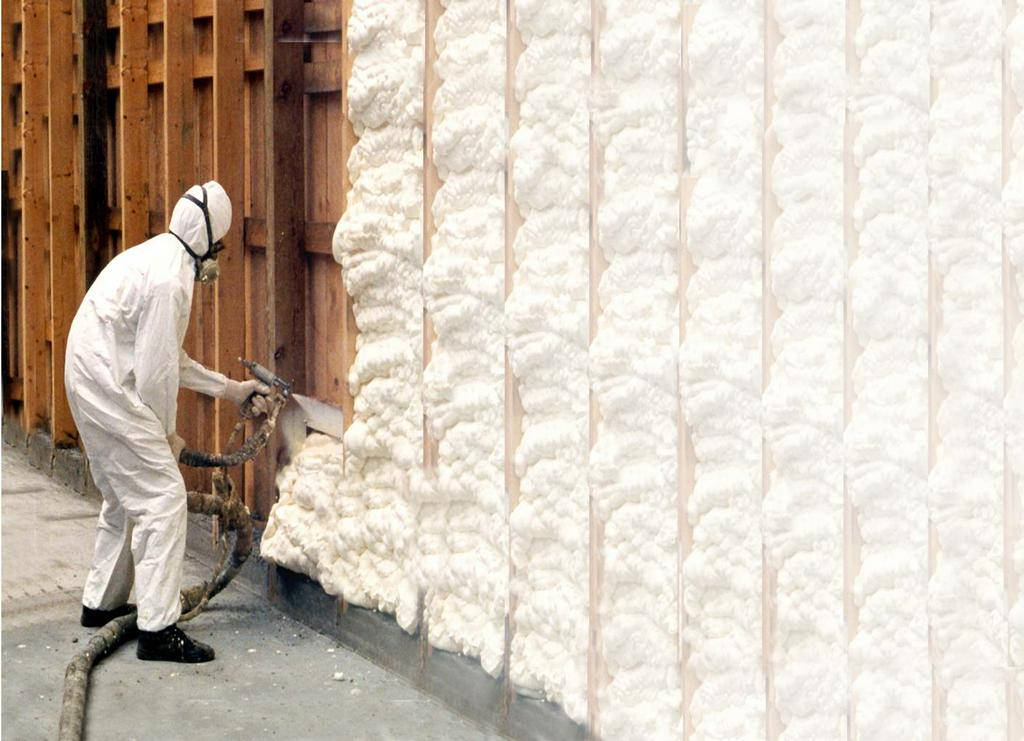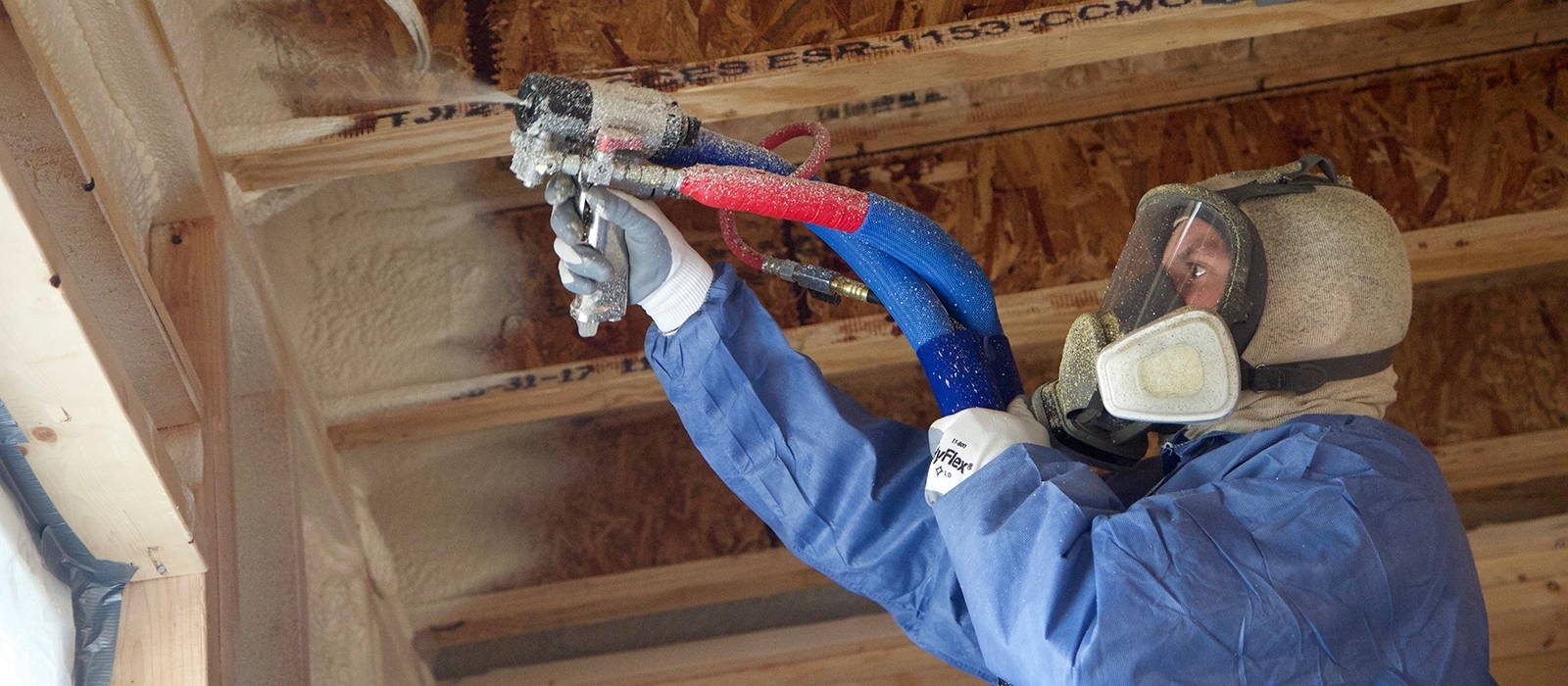Picking the Right Type of Spray Foam for Your Insulation Requirements
Picking the Right Type of Spray Foam for Your Insulation Requirements
Blog Article
Spray Foam: The Ultimate Solution for Air Sealing and Insulation
Spray foam insulation has actually become a leading service for reliable air securing and thermal insulation, offering an one-of-a-kind combination of buildings that set it besides traditional methods. Its capability to broaden and load gaps makes it particularly efficient in stopping air leak, which can significantly affect energy effectiveness. Understanding the full scope of its benefits, installation procedures, and contrasts with various other insulation kinds is vital for making educated choices. As we check out these elements, the ramifications for both new building and constructions and retrofits become increasingly significant. What factors should influence your choice?
What Is Spray Foam?
Spray foam is a versatile insulation product that integrates the principles of air securing and thermal resistance to improve power performance in structures. Composed largely of polyurethane or various other similar substances, spray foam is applied as a fluid that broadens upon call with surface areas, creating a strong, constant layer of insulation. This unique home permits it to fill up gaps, splits, and spaces that traditional insulation products may forget, providing a superior air seal.
There are 2 main sorts of spray foam: open-cell and closed-cell. Open-cell spray foam is lighter and much more adaptable, using exceptional sound absorption and a reduced R-value per inch - Spray Foam. In contrast, closed-cell spray foam is denser, giving a higher R-value, dampness resistance, and added architectural stability to building elements
The application procedure usually involves specific tools, guaranteeing a seamless application that abides by various substratums, consisting of timber, concrete, and metal. This flexibility makes spray foam appropriate for both brand-new constructions and retrofitting existing structures. Its capability to develop an airtight barrier substantially adds to decreasing power intake and improving indoor air high quality, therefore making it a favored selection among home builders and home owners alike.
Advantages of Spray Foam Insulation
Among one of the most substantial benefits of spray foam insulation is its remarkable capability to produce a constant air obstacle, which effectively lessens power loss. Unlike typical insulation products, spray foam increases to fill up splits and spaces, making certain that air leak is significantly reduced. This characteristic not only enhances power performance yet additionally brings about decrease utility bills over time.
Additionally, spray foam insulation gives premium thermal resistance, adding to a much more stable indoor setting. Its high R-value per inch enables reliable insulation in restricted spaces, making it perfect for attics, walls, and crawl spaces. Furthermore, the moisture-resistant residential properties of spray foam assistance avoid mold and mildew and mold development, advertising healthier living conditions.
One more vital benefit of spray foam insulation is its sound-dampening top qualities (Spray Foam). It efficiently lowers noise transmission between rooms, developing a quieter and much more comfy home atmosphere. The resilience of spray foam likewise stands apart, as it does not droop or work out over time, preserving its efficiency throughout its life expectancy
Just How Spray Foam Functions
Comprehending how spray foam insulation works is essential for appreciating its performance in air sealing and thermal resistance. Spray foam insulation is composed of 2 primary elements: isocyanate and polyol material. When these components are blended, they undergo a chain reaction that creates the product to increase swiftly, developing a dense foam that fills up cracks, gaps, and tooth cavities.
As the foam expands, it abides by surface areas, developing a closed seal that significantly decreases air infiltration. This particular makes spray foam insulation very reliable at preventing drafts and moisture penetration, which can result in energy loss and damages gradually. In addition, the closed-cell version of spray foam supplies exceptional thermal resistance because of its stiff framework, properly decreasing warmth transfer.
The unique residential or commercial properties of spray foam enable it to adjust to uneven surface areas, making certain thorough insurance coverage and a seamless obstacle. Because of this, spray foam insulation not only enhances energy efficiency but additionally adds to enhanced interior air quality by reducing the build-up of contaminants and allergens. Ultimately, understanding the technicians behind spray foam emphasizes its function as an exceptional option for insulation and air sealing in both industrial and domestic applications.
Setup Process Review

Prior to installation, the space needs to be properly cleaned up and prepped, ensuring that surfaces are free from dirt, particles, and moisture. This action is you can try these out crucial since pollutants can endanger attachment and overall performance. Once the area is prepared, the application involves mixing both elements of the spray foam, which expands upon get in touch with and fills up spaces properly.
Educated professionals need to conduct the installment, utilizing specialized equipment to ensure uniform coverage and optimal thickness. Safety and security safety measures, consisting of putting on safety gear and look at more info ensuring proper ventilation, are essential during this process. After application, the foam normally remedies swiftly, developing a solid barrier that enhances energy effectiveness.
Comparing Spray Foam to Typical Insulation
When evaluating insulation alternatives, spray foam insulation stands out in comparison to typical materials such as fiberglass and cellulose. Unlike fiberglass and cellulose, which can allow air seepage, spray foam expands upon application, filling up spaces and gaps to create an impermeable seal.
Furthermore, spray foam offers a greater R-value per inch than conventional insulation kinds, providing even more efficient thermal resistance in a thinner account. This characteristic is specifically helpful precede with minimal tooth cavity deepness. Spray foam is immune to dampness and mold growth, which can be a substantial concern with cellulose and fiberglass, especially in damp settings.
Nonetheless, spray foam insulation typically brings a higher in advance expense than its typical counterparts. Property owners need to consider this first financial investment versus long-term energy savings and performance benefits. Inevitably, while both insulation kinds serve their function, spray foam becomes a much more sophisticated option for contemporary insulation requirements, especially in terms of air sealing and thermal performance.

Verdict
In summary, spray foam insulation stands for a very reliable solution for accomplishing optimal air securing and thermal resistance. Its unique properties, consisting of wetness resistance and audio dampening, make it ideal for various applications in both new building and constructions and retrofitting jobs (Spray Foam). Although the initial costs may be higher contrasted to typical insulation materials, the long-lasting advantages, such as substantial power savings and visit our website improved indoor air high quality, validate the financial investment and emphasize its worth in modern-day structure techniques.
Spray foam insulation has emerged as a leading option for reliable air securing and thermal insulation, offering a distinct combination of buildings that establish it apart from traditional methods.Spray foam is a versatile insulation material that combines the principles of air securing and thermal resistance to improve energy effectiveness in buildings.When examining insulation choices, spray foam insulation stands out in comparison to conventional materials such as fiberglass and cellulose. Ultimately, while both insulation types serve their purpose, spray foam emerges as an extra innovative remedy for contemporary insulation requirements, especially in terms of air sealing and thermal efficiency.
In recap, spray foam insulation stands for an extremely reliable option for accomplishing optimum air sealing and thermal resistance.
Report this page